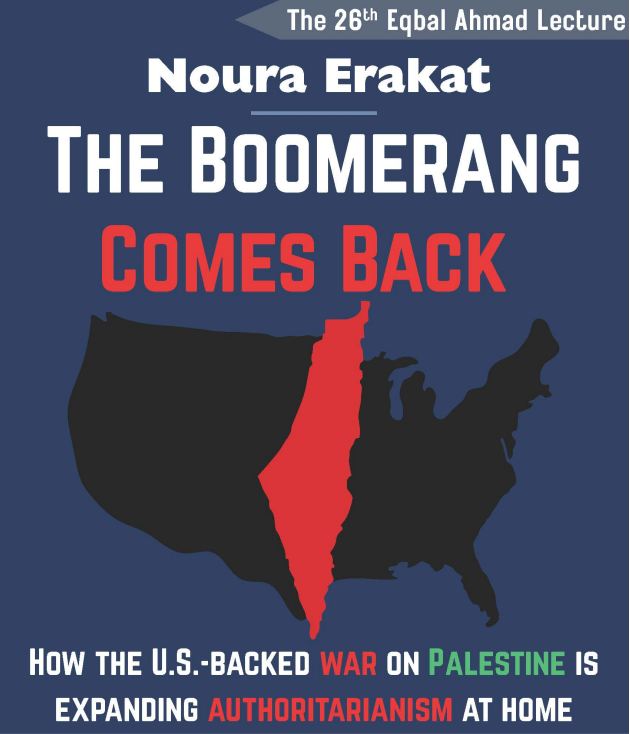The Annual Eqbal Ahmad Lecture Features Noura Erakat: How the US-Backed War on Palestine Is Expanding Authoritarianism at Home

Photo: hampshire.edu
The 26th annual Eqbal Ahmad lecture will be held on Friday, April 25 in Franklin Patterson Hall’s main lecture hall at Hampshire College. The lecture will take place at 4 p.m. This year’s speaker will be Noura Erakat, professor of Africana studies and criminal justice at Rutgers University. Her talk is entitled “The Boomerang Comes Back: How the U.S.-Backed War on Palestine Is Expanding Authoritarianism at Home.”
Erakat is the author of Justice for Some: Law and the Question of Palestine (Stanford University Press, 2019). She is also the co-founding editor of Jadaliyya and an editorial board member of the Journal of Palestine Studies and Human Geography. She has served as legal counsel for a Congressional subcommittee in the U.S. House of Representatives, as legal advocate for the Badil Resource Center for Palestinian Refugee and Residency Rights, and as national organizer of the U.S. Campaign to End the Israeli Occupation. She has also produced video documentaries, including Gaza in Context and Black Palestinian Solidarity.
The annual Eqbal Ahmad lecture is held in memory of the late longtime Hampshire College professor. It honors his teaching, scholarship, and activism. Professor Ahmad’s faculty colleagues, former students, family, and friends from around the globe have joined together to make this lecture series a continuing celebration of his life and work.
Eqbal Ahmad was born in the village of Irki in Bihar, India in 1933 or 1934 to an Indian Muslim landowning family. A few years later his father was murdered over a land dispute while the young Eqbal lay beside him. Upon the partition of India in 1947, he and his elder brothers migrated to Pakistan. Ahmad’s first degree in 1951, from Foreman Christian College in Lahore, Pakistan, was in economics. He received an M.A. in Modern History in 1953 from Punjab University in Lahore, and went on to study American history at Occidental College in California as a Rotary Fellow in 1957. It was there that his interest was aroused in the history of native Americans and the settler colonialism that resulted in their near extinction.
He went on study political science and Middle East history at Princeton where he wrote a doctoral dissertation on the Tunisian labor movement. This work formed the basis of a lifelong interest in working-class politics. Along with Stuart Schaar, he wrote about North African trade union activists and progressive voices such as Tahar Haddad. From 1962 to 1964, Ahmad lived in North Africa, mainly in Tunisia, where he conducted his thesis research on trade unions and became a close student and active supporter of the Algerian Revolution.
Following the 1967 Arab-Israeli war, his public advocacy of Palestinian rights cost him isolation within the academy. In January 1971, Ahmad was indicted with the anti-war Catholic priest Phillip Berrigan, and six other Catholic pacifists, on federal charges of conspiracy to kidnap Henry Kissinger and to blow up the heating systems of several federal buildings in Washington, D.C. (Daniel Berrigan was an unindicted co-conspirator in the case).
In 1982, Ahmad joined the faculty at Hampshire College, where he was Professor of Politics and Middle East Studies for fifteen years, until his retirement in 1997. In 1990, he began splitting his time between Islamabad and Amherst, a pattern that continued until his death. During this period, he began to write weekly columns for Dawn, Pakistan’s oldest English-language newspaper. His columns also regularly appeared in Al Ahram in Egypt.
